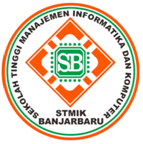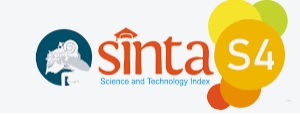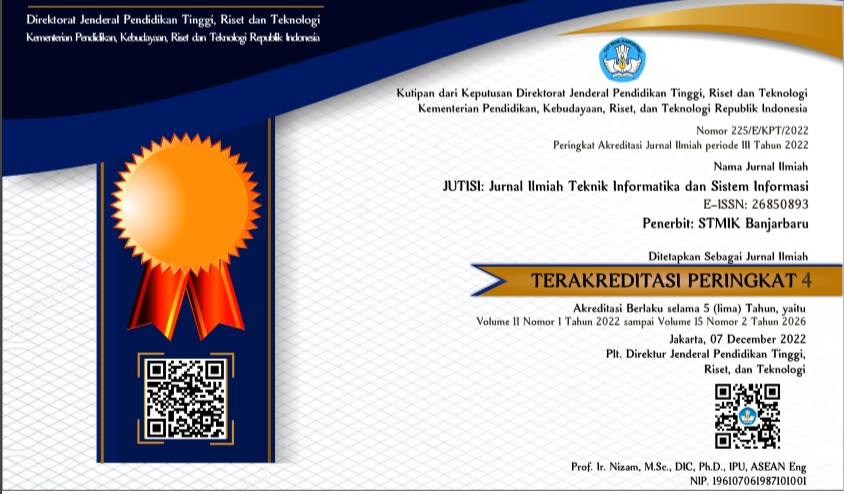Analisis EUCS Terhadap Niat Menggunakan dan Implikasinya Pada Dampak Sistem E-learning
Abstract
The problem addressed in this research is the need to understand and evaluate the impact of End User Computing Satisfaction (EUCS) on the usage intention and overall impact of the e-learning system. The objective of the study is to analyze the relationship between user satisfaction, system usage, and system impact in the context of e-learning. The study involved 219 respondents with valid and reliable sample data. Smart PLS analysis was used to test the proposed hypotheses. The results of the three tested hypotheses showed that End User Computing Satisfaction has a positive and significant influence on usage, End User Computing Satisfaction has a positive and significant influence on system impact, and usage has a positive and significant influence on system impact. The research findings indicate that user satisfaction plays a crucial role in the development of an effective e-learning system.
Keywords: End user Computing Satisfaction; Delone and Mclean Model; Use; System Impact
Â
Abstrak
Permasalahan yang ditangani dalam penelitian ini adalah perlunya memahami dan mengevaluasi dampak kepuasan pengguna akhir komputasi End User Computing Satisfaction (EUCS) terhadap penggunaan sistem e-learning dan dampak keseluruhan pada sistem tersebut. Tujuan penelitian yaitu menganalisis hubungan antara kepuasan pengguna, penggunaan sistem, dan dampak sistem dalam konteks e-learning. Studi ini melibatkan 219 responden dengan data sampel yang valid dan dapat diandalkan. Analisis Smart PLS digunakan untuk menguji hipotesis-hipotesis yang diajukan. Hasil dari tiga hipotesis yang diuji menunjukkan bahwa Kepuasan Pengguna Akhir Komputasi (End User Computing Satisfaction) memiliki pengaruh positif dan signifikan pada penggunaan, Kepuasan Pengguna Akhir Komputasi memiliki pengaruh positif dan signifikan pada dampak sistem (System Impact), dan penggunaan memiliki pengaruh positif dan signifikan pada dampak sistem. Temuan penelitian menunjukkan bahwa kepuasan pengguna memainkan peran penting dalam pengembangan sistem e-learning yang efektif.
Â
Keywords
References
M. A. Almaiah et al., “Examining the Impact of Artificial Intelligence and Social and Computer Anxiety in E-Learning Settings: Students’ Perceptions at the University Level,†Electron., vol. 11, no. 22, pp. 1–22, 2022, doi: 10.3390/electronics11223662.
C. S. Santiago Jr, M. P. Leah Ulanday, Z. R. Jane Centeno, M. D. Cristina Bayla, and J. S. Callanta, “Flexible Learning Adaptabilities in the New Normal: E-Learning Resources, Digital Meeting Platforms, Online Learning Systems and Learning Engagement,†Asian J. Distance Educ., vol. 16, no. 2, p. 43, 2021, [Online]. Available: http://www.asianjde.com/.
R. Masa’Deh, D. Almajali, A. Alrowwad, R. Alkhawaldeh, S. Khwaldeh, and B. Obeidat, “Evaluation of factors affecting university students’ satisfaction with e-learning systems used during Covid-19 crisis: A field study in Jordanian higher education institutions,†Int. J. Data Netw. Sci., vol. 7, no. 1, pp. 199–214, 2023, doi: 10.5267/j.ijdns.2022.11.003.
C. Azlan et al., “Teaching and learning of postgraduate medical physics using Internet-based e-learning during the COVID-19 pandemic – A case study from Malaysia,†Phys. Medica, vol. 80, no. January, pp. 10–16, 2020.
T. Chen, G. Cong, L. Peng, X. Yin, J. Rong, and J. Yang, “Analysis of user satisfaction with online education platforms in china during the covid-19 pandemic,†Healthc., vol. 8, no. 3, 2020, doi: 10.3390/healthcare8030200.
A. Ardianto, S. Fauziati, and E. Nugroho, “Faktor-Faktor Yang Mempengaruhi Kepuasan Pengguna Akhir Sistem Informasi Sumber Daya Manusia (Studi Kasus Di Bpk) Ri),†Semin. Nas. Teknol. Inf. dan Multimed., vol. 2, no. 7, pp. 1–6, 2014, [Online]. Available: https://sisdm.bpk.go.id.
R. H. Putra, N. Aprila, F. Marietza, and M. Hatta, “Kualitas Sistem Informasi, Kualitas Informasi Dan Perceived Usefulness Terhadap Kepuasan Pengguna Akhir Software Analisis Kredit,†J. Akunt., vol. 10, no. 3, pp. 245–260, 2020, doi: 10.33369/j.akuntansi.10.3.245-260.
D. A. Nani and L. F. Lina, “Determinants of Continuance Intention to Use Mobile Commerce during the Emergence of COVID-19 In Indonesia: DeLone and McLean Perspective,†Sriwij. Int. J. Dyn. Econ. Bus., vol. 5, no. 3, p. 261, 2022, doi: 10.29259/sijdeb.v5i3.261-272.
Ö. Efilo, “Examining an e-learning system through the lens of the information systems success model : Empirical evidence from Italy,†2018.
C. Pinho and M. Franco, “Application of innovation diffusion theory to the E-learning process : higher education context,†2020.
M. F. Satyadarma and S. Syamsudin, “Pengaruh kualitas sistem, kualitas informasi, dan kualitas layanan terhadap kepuasan pengguna e–learning di Perguruan Tinggi,†Bull. Educ. Manag. Innov., vol. 1, no. 1, pp. 37–50, 2023, doi: 10.56587/bemi.v1i1.72.
S. Mardiana, J. H. Tjakraatmadja, and A. Aprianingsih, “DeLone-McLean Sistem Informasi Sukses Model Revisited : Pemisahan Niat untuk Gunakan - Gunakan dan Integrasi Teknologi Model Penerimaan,†Int. J. Ekon. dan Isu Keuang., vol. 5, pp. 172–182, 2015.
N. N. Pusparini and A. Sani, “Mengukur Keberhasilan Penerapan Sistem Informasi Akademik Dengan Model Kesuksesan Delon and Mclean,†METHOMIKA J. Manaj. Inform. dan Komputerisasi Akunt., vol. 4, no. 2, pp. 149–155, 2021, doi: 10.46880/jmika.vol4no2.pp149-155.
H. Hengky and S. Satrianansyah, “Analisis Kepuasan Pengguna Terhadap Sistem E–Raport Menggunakan Metode EUCS dan Model Delone and McLean,†JURIKOM (Jurnal Ris. Komputer), vol. 9, no. 5, p. 1487, 2022, doi: 10.30865/jurikom.v9i5.4906.
Fiki Abdullah Afif and Zulherman, “Pengaruh Faktor Kepuasan Dan Self-Efficacy Terhadap Minat Siswa Sekolah Dasar Menggunakan Aplikasi Nearpod: an Extended Delone Mclean Model,†J. Cakrawala Pendas, vol. 8, no. 4, pp. 1065–1080, 2022, doi: 10.31949/jcp.v8i4.2818.
A. R. Darwi and E. Efrizon, “Analisis Kepuasan Pengguna E-Learning Sebagai Pendukung Aktivitas Pembelajaran Menggunakan Metode Eucs,†Voteteknika (Vocational Tek. Elektron. dan Inform., vol. 7, no. 1, p. 25, 2019, doi: 10.24036/voteteknika.v7i1.103639.
N. A. Hidayah, E. Fetrina, and A. Z. Taufan, “Model Satisfaction Users Measurement of Academic Information System Using End-User Computing Satisfaction (EUCS) Method,†Appl. Inf. Syst. Manag., vol. 3, no. 2, pp. 119–123, 2020, doi: 10.15408/aism.v3i2.14516.
M. Ali, T. Ramayah, and J. Cheah, “PLS-SEM Statistical Programs : A Review,†J. Appl. Struct. Equ. Model., vol. 5, no. 1, pp. i–xiv, 2021, doi: 10.47263/JASEM.5(1)06.
V. G. K. Joe F. Hair Jr, Marko Sarstedt, Lucas Hopkins and Article, “Partial least squares structural equation modeling ( PLS-SEM ) An emerging tool in business research,†Eur. Bus. Rev., vol. 26, no. 2, pp. 106–121, 2016, doi: 10.1108/EBR-10-2013-0128.
A. Mukminin, A. Habibi, M. Muhaimin, and L. D. Prasojo, “Exploring the drivers predicting behavioral intention to use m-learning management system: Partial least square structural equation model,†IEEE Access, vol. 8, 2020, doi: 10.1109/ACCESS.2020.3028474.
How To Cite This :
Refbacks
- There are currently no refbacks.











